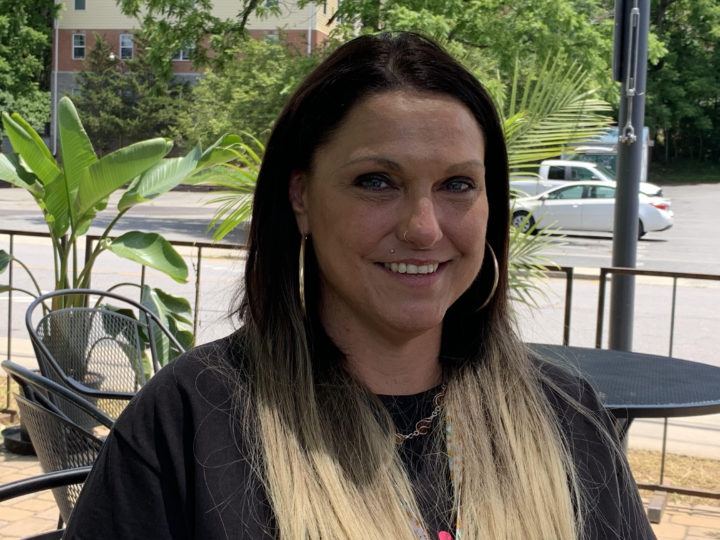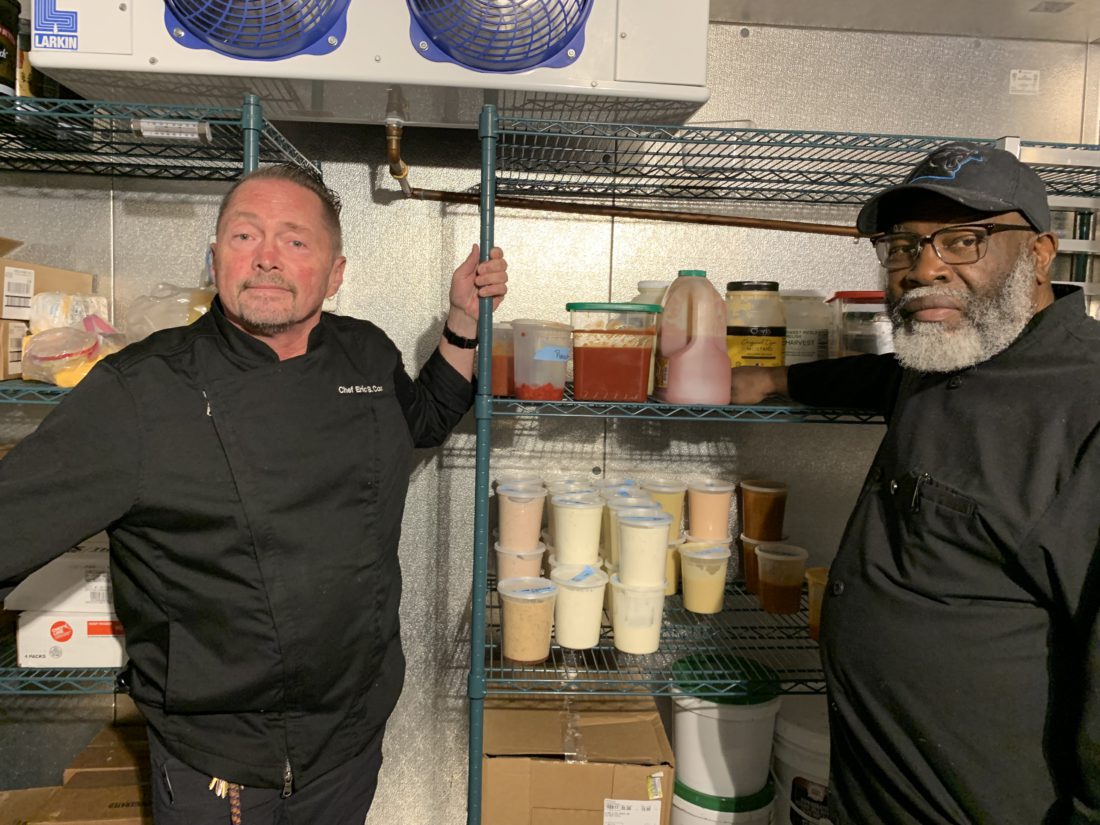These days when Amanda Layton eats a hot meal at the Haywood Street Congregation’s Downtown Welcome Table, she knows most of the people there. But that wasn’t always the case. In 2021, Layton was homeless, hungry and addicted to drugs, living in her car. She didn’t know where or how to get help.
From the Swain County jail in early 2021, she was sent to a sober living house in Asheville and began learning about all the resources available in town. “I went to MANNA for food even when I had a roof,” Layton says. And though she’s working now for Sunrise Community for Recovery & Wellness, she still appreciates a free meal at 12 Baskets Cafe or the Welcome Table.
And she brings her friends and clients with her. “It’s so different in Asheville,” Layton says. “Folks make you feel good and not shamed when you go to these places to eat. It’s not like that in some government social service agencies and other counties.”
As inflation and supply chain issues continue to increase everyday costs, more locals, regardless of their employment status, are following Layton’s lead. For organizations and nonprofits offering free and healthy meals, part of the mission is to make all feel welcome. These same groups are also working to educate community members on how to stretch a dollar in order to make the most of every bite.
No questions asked
When Bounty & Soul founder and executive director Ali Casparian started the Black Mountain community food market in 2014, she swore she wouldn’t make people feel ashamed about asking for help. Having previously been homeless and hungry in Asheville after leaving a violent household, she knew how it felt.
“It’s hard enough to be in this position,” she says. But to then have to “prove you’re on a fixed income and food insecure is awful and dehumanizing.”
Today, Bounty & Soul hands out boxes of fresh, organic produce, bread, spices and other food to hundreds of people twice a week in an empty Bi-Lo parking lot in downtown Black Mountain, 205 N.C. 9. Once a week, the nonprofit also delivers to the mercadio communitario de Sherwood, serving the Latin community at 21 Sherwood Park Drive, Swannanoa.
“The only thing we ask is how many people are in the household, and that’s so we can track how many people we serve,” says associate director Paula Sellars.
MANNA Foodbank takes a similar approach at its mobile markets across 16 WNC counties.
Linda Siegall and Marc Foster drive from Asheville once a week to pick up their free food. “We save about $250 a month,” Foster says. “We even had a Bounty & Soul wedding, as they donated the flowers for our service.”
Like Bounty & Soul, Haywood Street Congregation’s Downtown Welcome Table also serves the WNC community twice a week. More than 100 guests, ranging from local business folks to the unhoused, pass through the dining hall for a free, healthy and hot meal.
“We don’t use donated food for our meals but purchase everything we use,” says Katlyn Zulinke Mailman, the organization’s companion coordinator. “We practice a theology of abundance, which means we always have more than enough to serve.”
Kara Irani, director of marketing and communications for MANNA, says that one of the biggest obstacles they face when trying to give away food at the mobile markets is overcoming the stigma associated with getting help. “People think they’re taking from people that need it more,” she says. “Actually, most of the people we serve are working full time.” The roving mobile markets are posted on the nonprofit’s website each week. Learn more at avl.mx/bp7.
Meanwhile, the WNC YMCA also operates mobile food markets that are free to all, regardless of income or housing status. Locations are listed on the organization’s website at avl.mx/bp8.
Waste not
Along with providing free meals, local nonprofits also advocate for community health. Cooking at home, organizational leaders stress, is a great way to eat healthier, less expensive meals.
Eric Cox is food services manager for Asheville Buncombe Community Christian Ministry and oversees more than 1,000 free meals a day at three transitional housing locations. He lives by a mantra of “nothing goes to waste.” Soups, stews and casseroles are great ways to stretch healthy food ingredients, he says. Cox also never buys any stock for his dishes. “Save and then boil all the vegetable peelings and ends of celery stalks, roots and chicken bones you have,” he notes. “Strain it, and you have the best stock around.”
Jaime Frinak, an Asheville nutritionist and owner of Food with Attitude, is a big fan of learning how to use different spices to keep things interesting with home-cooked meals. “Spices turn ordinary food into tasty and satisfying meals and snacks,” she says.

Siegall and Foster say they love to experiment with sautéed dishes. “I’ll sauté onions and potatoes and then add some of the veggies I got for free in whatever oil we have, throw in kale, peppers and whatever else we get that week and then top it with whipped eggs — we have a great meal,” Foster says.
“And smoothies are a regular part of our everyday diet where we can use up all the fruit we get,” Siegall adds.
Flexibility is important too. At Haywood Street Congregation, banquet steward and chef de cuisine Jinnia Siironen says she loves the challenge of coming up with great-tasting meals from the foods purchased each week. “We buy what’s on sale and what’s in season as well as what our big suppliers have extra that they can give me a good deal on,” Siironen says.
“First thing I do is see what I have on hand and then figure out different ways to use it,” she continues. “Like if I have a lot of peppers, I might plan stuffed peppers, tacos, tortillas and casseroles.”
Making and freezing bigger batches is another way to save on costs. Also, don’t shy away from bruised produce, experts say. “Just cut out the blemishes,” Cox advises.
Lastly, knowing where to find good deals always helps an individual’s bottom line. “I encourage people to use local resources too,” Frinak says. “Hopey and Co. is a great place to get healthy food at lower prices as are local farmers markets. Sign up for grocery store incentives and be flexible so you can take advantage of sales.”
Make it Happen
For those who don’t know a spatula from a frying pan, many nonprofits offer cooking courses and guidance for what to do with the food they provide. Bounty & Soul produce boxes include recipes for dishes using ingredients from that day’s inventory. On the organization’s website, additional recipes from area nutritionists are also available for creating healthy meals, as well as recorded cooking classes for kids.
Casparian says she looks forward to holding in-person cooking classes at the local markets each week once the pandemic restrictions loosen up more. She suggests regularly checking the website, avl.mx/bpa.
Irani at MANNA says that cooking demos at their markets hopefully will return this year too. For now, the group continues to post recipes and cooking classes on its YouTube channel, avl.mx/bpb.
The YMCA also is ramping up educational programs at its weekly mobile food markets. Barring any unforeseen obstacles, the first cooking demo since the onset of the pandemic is scheduled for Thursday, July 7, 11 a.m.-3 p.m., at the downtown location. There will be cooking demos, free samples, a mini-market and information sessions. Julia Costa, healthy living mobile market coordinator, says the YMCA hopes to host monthly events like these throughout the region.
Regardless of where a person turns in times of need, the point is that help is available, says Layton. Reflecting on her own journey, she says she probably wouldn’t be alive today if it wasn’t for community members who offered assistance without judgment.
“People don’t think it can be them,” she says. “Until it is them.”




Groce United Church in East Ashevile, on Tunnel RD, has a Welcome Table on Thursday Evenings. All are welcome.